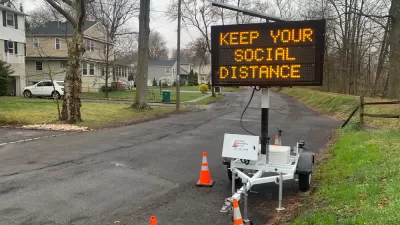As is so often the case worldwide, many Parisians live in communities distinguished by class. The city government wants to change that by inserting thousands of public housing units in wealthy central districts.

Like many European cities (and, increasingly, American ones), Paris has a rich city center surrounded by less wealthy outer districts. Most of the city's affordable housing is concentrated in the east, and segregation by wealth is becoming a problem for the current city government. In response, Paris "is building a large amount of [affordable units] between now and 2020, with one significant twist. Almost 5,000 of these new affordable units will be built in the city's center and west, giving future tenants some of the wealthiest neighbors in all France."
On top of that, Feargus O'Sullivan writes, "Paris hopes to create 7,000 new public housing units every year between now and the next elections in 2020. Given that only 5,000 units in total are planned for especially prosperous areas across this period, that means that most new units will still be created in the less wealthy east, where most of the city's public housing is already concentrated."
Paris Habitat Commissioner Ian Brossat maintains that the city has the budget to acquire expensive central properties and build affordable housing, saying, "I am very clearly taking on the political objective of rebalancing [the city]. We want to avoid having two Parises, even if it is expensive to do so."
An admirable goal, but vested neighborhood interests and the gravitational pull of central districts on real estate money will be hard to beat.
FULL STORY: Paris Declares War on 'Ghettoes for the Rich'

Maui's Vacation Rental Debate Turns Ugly
Verbal attacks, misinformation campaigns and fistfights plague a high-stakes debate to convert thousands of vacation rentals into long-term housing.

Planetizen Federal Action Tracker
A weekly monitor of how Trump’s orders and actions are impacting planners and planning in America.

Chicago’s Ghost Rails
Just beneath the surface of the modern city lie the remnants of its expansive early 20th-century streetcar system.

Bend, Oregon Zoning Reforms Prioritize Small-Scale Housing
The city altered its zoning code to allow multi-family housing and eliminated parking mandates citywide.

Amtrak Cutting Jobs, Funding to High-Speed Rail
The agency plans to cut 10 percent of its workforce and has confirmed it will not fund new high-speed rail projects.

LA Denies Basic Services to Unhoused Residents
The city has repeatedly failed to respond to requests for trash pickup at encampment sites, and eliminated a program that provided mobile showers and toilets.
Urban Design for Planners 1: Software Tools
This six-course series explores essential urban design concepts using open source software and equips planners with the tools they need to participate fully in the urban design process.
Planning for Universal Design
Learn the tools for implementing Universal Design in planning regulations.
planning NEXT
Appalachian Highlands Housing Partners
Mpact (founded as Rail~Volution)
City of Camden Redevelopment Agency
City of Astoria
City of Portland
City of Laramie





























